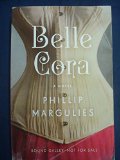Reading Guide Questions

Please be aware that this discussion guide will contain spoilers!
- What role do the forward and the introduction play in Belle Cora?
- Why do you think the San Francisco earthquake of 1906 prompted Belle to tell her life's story?
- Belle mentions that the book's purpose is not to instruct others on how to live, and insists that her sole purpose is "to tell what happened." Based on the rest of the novel, is she as indifferent to morality as she pretends?
- In Belle's introduction Belle calls Harriet Atherton, mother of the feeble-minded Jennifer "my old enemy, the good Christian woman." Yet Belle's mother was also a good Christian woman who would never have approved of the way Belle has lived her life. What led Belle away from the faith of her forebears?
- Why does Lewis become so attached to Horace during the children's journey from New York to Livy? How does this foreshadow Lewis's later attachments to Matthew, to Tom Cross/Jack Cutter, and to David Broderick?
- Lewis and Belle are uprooted from their home and family. How do their different ages and personalities at the time make this trauma unique for each of them? Which is the more severely damaged? Is the criminal path they both take in life the result of this early trauma?
- Belle loses her mother and father at the age of nine. Later she encounters a series of (mostly unsatisfactory) surrogate parents; beginning with her grandmother and grandfather, then her aunt and uncle. Who are some of the others and how do they succeed or fail in their role?
- Belle's aliases are a big part of the book. How does shedding her name help Belle move past disappointments and forge a new identity? What are the limitations to self-reinvention here?
- Lewis is obviously Belle's favorite brother. But between the other two, Edward and Robert, who do you think she cares for more, and why?
- Belle's love for Jeptha is rooted in her feeling that he understands and approves of her: yet from about the middle of Book Two she begins to lie to him, putting herself beyond the reach of his understanding. Does Belle turn Jeptha into a fool, loving someone whom he doesn't really know? Or are we allowed to keep a secret or two even from those closest to us?
- The last chapters of Book Two turn on an historical episode; thousands of people across the United States believed that the world would end by October 1844. How does this event compare with recent end-of-the-world predictions associated with the prophecies of Nostradamus and the Mayan calendar, and the frequent end-time prophecies of evangelists like Billy Graham? Why do people continue to predictions despite their perfect record of 100% inaccuracy?
- In her discussion of Aunt Agatha's beliefs near the end of Book 2, Belle calls into question the very logic of eternal reward and punishment in the afterlife. She asks how a good person can be happy in heaven knowing that a loved one suffers forever. What do you think of her reasoning?
- The San Francisco Committee of Vigilance really did take over the city in 1851 and 1856, with the excuse that the city was lawless and its government hopelessly corrupt. For over a century, mainstream historians sided with the vigilantes. More recently, revisionist historians agree with Belle that the vigilantes were unjustified Why do you think historians changed their views? What does this say about the role played in American politics by the legend of the taming of the West?
- In Books Two through Four, Agnes, Belle's nemesis, outwardly resembles the Victorian ideal of passive femininity though in fact she is a cunning schemer. But when Belle meets her near the end of Book Five, Agnes has turned into a proponent of free love and feminism. Is Agnes's transformation convincing? Are we meant to believe it?
- Where does Belle stand with respect to women's rights? Belle has a great deal of freedom, and she earns her own money. But she gets these things by running a brothel, where wealthy men pay for sex with beautiful women. In the end, which sort of woman did more to advance the cause of women's dignity and freedom? The madams like Belle, or the respectable women who wanted to close the brothels and the gambling halls?
- As a narrator Belle is at pains to wise us up about the seamy side of life. Yet in the end she has a word to say in favor of self-deception: "They protect us, these vast lies the whole community embraces... If they believe in an absurdity, it is because they know deep down that it is more useful to them than the truth." Does she mean it? Is it true?
Unless otherwise stated, this discussion guide is reprinted with the permission of Anchor Books.
Any page references refer to a USA edition of the book, usually the trade paperback version, and may vary in other editions.

 Book Reviewed by:
Book Reviewed by:





